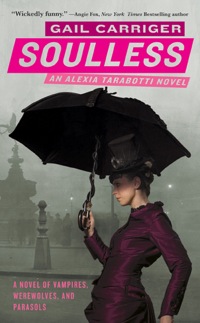Vampires, werewolves, and parasols. Oh my.
I’m not one to use the word “delightful.” It doesn’t cross my lips in conversation or in writing. I’m a cynical geek, and while most geeks experience love, hate, obsession, desire, and myriad other emotions, delight is just too… pure of a feeling for the die-hard cynics among us. Our smiles must have a twist of the ironic, our pleasure has to come with a wink. Delight is not something we come by often.
However, I can say without reservation that Gail Carriger’s Soulless is an absolute delight to read.
Carriger’s first, the book takes place in Victorian London: an aging (mid-twenties) spinster, Alexia Tarabotti, who happens to be without a soul, is put in the horribly awkward social position of accidentally killing a vampire at a gathering. Her soulless aspect makes her a preternatural; it causes her to cancel out the supernaturals’ (werewolves, ghosts, and vampires) abilities when they touch. This makes her immune to all supernatural attacks, but really, since the supernaturals have been acclimated into polite society in the UK, she doesn’t really need those powers, does she? A vampire attacking a woman at a social gathering against her will is simply not done. Not to mention any vampire would have to be an idiot, or unschooled in what all vampires should know about Miss Tarabotti, to attack her. But one does, and the question of why leads Alexia and her companions to uncover the mystery of why vampires are appearing in odd places, unknown to the area hive queens and utterly ignorant of what it is to be a supernatural.
The world Carriger creates is so delicious, with the story holding tightly to Victorian values while bringing in supernatural society and forcing it into the mold. The vampires fit in nicely, but the werewolves are a tad rough to introduce to civilized society. While dirigibles float in the sky (sadly they merely mentioned in book one, but there are hints for more dirigible action in book two) and unaffiliated vampires and werewolves go missing, the pressing question is what Alexia’s mother and stepfather will do with an aging spinster.
The mythology brought about in the book regarding souls is interesting: souls are measure as if by volume, so if you have a strong soul then you can handle being turned into a vampire or werewolf. Weak souls die from an attack, unable to reanimate. But Miss Tarabotti is completely soulless, meaning that she cancels out supernaturals’ power. It’s assumed that she’s the antithesis of the supernaturals, a natural hunter of the supernaturals because she can’t be harmed by their powers.
For her own safety—and to save her family from embarrassment—Miss Tarabotti keeps said fact about her soul hidden from most, but the officials at BUR (the investigators into supernatural crimes) know. Very few others, including her family, are aware of this.
The characters are a lot of fun, with the headstrong spinster hero, Alexia, and her questionable heritage (her father was Italian, can you imagine?), the ancient dandy vampire Lord Akeldama who cares more for fashion, gossip, and young men than most anything else, and the gruff, handsome Lord Maccon, alpha werewolf and BUR official. He’s Scottish, but society manages to ignore that most of the time.
If you haven’t figured it out yet, Carriger shows an enviable talent for naming characters, with Miss Ivy Hisselpenny as Alexia’s best friend, who shows a horrific taste in hats, the Loontwills as her stepfather and half sisters, and Floote as the very capable and discrete manservant. These names made me want to read the book aloud.
Soulless makes one think of what would happen if you told an urban fantasy in the days of steampunk Victorian England. Yes, we have a heroine with some kind of super power, and there’s a love story, and there are vampires and werewolves. But Miss Tarabotti is very much a product of her upbringing; she’s headstrong, but much too ladylike to go using her powers to fight, goodness no. While smarter than most of the socialites around her, and eager to help the investigating werewolves, she is always mindful of her appearance and the Proper Way Things Are Done. Tarabotti is an excellent mix of upper class socialite and heroine.
Soulless has but one flaw, and while distracting, it hardly reduces the pleasure of reading the novel. The point of view jumps rather wildly from head to head, where we’ll see the scene from the POV of Miss Tarabotti, then Lord Maccon’s second in command, then Mrs. Loontwill, then back to Miss Tarabotti. Some scenes prove dizzying and one would wish the action had a scene break or two to show us different points of view instead of leaping from head to head.
But honestly, that infraction is minor to the fact that this book is delightful, funny, exciting, and difficult to put down. It made me want treacle tart and a parasol.
Mur Lafferty is an author and podcaster. She is the host of I Should Be Writing and the author of Playing For Keeps, among other things. You can find all of her projects at Murverse.com.










